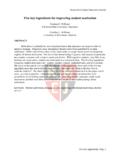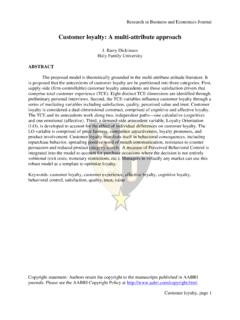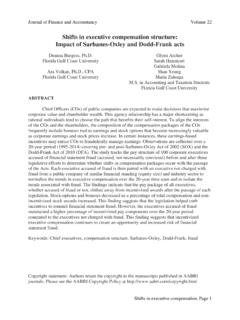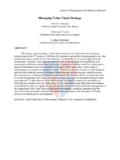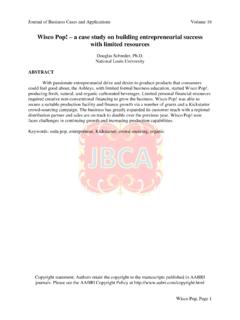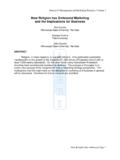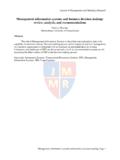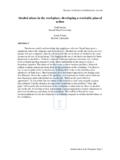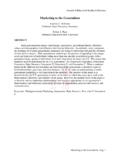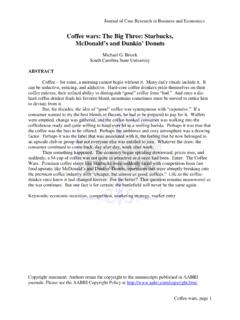Transcription of Human capital management in Zimbabwean rural schools: …
1 Journal of management and Marketing Research Volume 18- February, 2015 Human capital management , page 1 Human capital management in Zimbabwean rural schools: A socio-economic analysis Promise Zvavahera National University of Science and Technology, Zimbabwe ABSTRACT This paper discusses the impact of socio-economic factors in the management of Human capital in Zimbabwean rural schools. A case study approach was taken focusing on Mazowe District. The researcher used observations, questionnaires, telephone interviews and face to face interviews to obtain data from teachers and administrative staff in Mazowe District who were randomly selected.
2 The study found that teachers were disgruntled with their current salaries, poor working and living conditions thereby leading to poor educational results at both Primary and Secondary school levels. Accommodation for teachers and other infrastructure in most schools under the study were found to be inadequate and inhabitable. The study recommended that good compensation, good working conditions, adequate accommodation and teaching and learning materials and infrastructure are critical in motivating and retaining teachers in Zimbabwean rural schools. The study is significant in that it identifies promising areas on which the government can work on to provide quality education to the rural folk so that they can successfully participate in the national and global economy.
3 Keywords: Human capital , management , motivation, retention, socio-economic factors Copyright statement: Authors retain the copyright to the manuscripts published in AABRI journals. Please see the AABRI Copyright Policy at Journal of management and Marketing Research Volume 18- February, 2015 Human capital management , page 2 INTRODUCTION The socio-economic status of employees has great influence on the performance of employees. Organisations should regard their employees as the greatest assets who make organisations function (Cole, 2004). If employees are not happy they can move from one organisation to another looking for better salaries and good working conditions.
4 When working conditions are not favourable, employees lose enthusiasm to work for the organisation. Since employees are failing to have time for everything in their lives outside their ever demanding careers and this has the potential of reducing the quality of work. The physical and mental health of employees is also affected and this normally leads to stress thereby affecting productivity. Organisations should strive to motivate their employees through various means. Paramount to the survival of institutions or organisations is the motivation and job satisfaction of its workforce (Baron and Greenberg, 2003). LITERATURE REVIEW Human capital is defined as people who work in organisations to achieve set goals and objectives (United Sates General Accounting Office Report, 2000).
5 Employees are keen to work hard in conducive environments, get good pay, fair treatment, security and power to control their work. To this end, organisations are then made to understand that motivation and retaining staff is critical and needs a holistic approach. It can also be concluded that employees are the most important and complex resource, who determine whether organisations will fail or survive. Organisations must make sure that their reward systems are well designed to meet the expectations of their employees (Okojie, 2009). Retention and motivation are becoming a challenge since employees and labour laws are increasingly becoming demanding and more complex on a daily basis (Lumley, Coetzee, Tladinyane, and N.)
6 Ferreira, 2011). Job satisfaction is influenced by working conditions. Motivation can be defined as the force that prompts action in a positive direction (Maicibi, 2004). Motivation refers to all forms of forces that are positive and are shown in employees through the achievement of organisational and individual goals. Research has shown that there are many variables at play that motivate employees. Taylor (1917) had an assumption that employees are motivated by high salaries and this notion was however, refuted by Herzberg (1959) in his Two Factor Motivation Theory . management should be concerned with the creation, development and maintenance of an environment to which individuals work together in groups towards the accomplishment of common organisational objectives and goals (Maicibi, 2004).
7 An organisation cannot effectively and efficiently achieve its mission without motivating and retaining its personnel to work together towards the achievement of set goals and objectives. Most rural schools lag behind in terms of infrastructure, learning and teaching materials and basic services (Peresuh and Nhundu, 1999). It is difficult for rural schools to recruit and retain qualified and experienced teachers for various reasons, which include poor accommodation, limited availability of clean water supplies, unavailability of electricity, unreliable transportation, lack of social services and other facilities as well as poor remuneration. Studies from various countries indicate that most teachers prefer to work in urban areas due to the disadvantages inherent in rural areas.
8 Studies carried out in Lesotho, Malawi, Mozambique, Uganda and Tanzania, identified the above as problems being faced by rural school teachers (Mulkeen, 2005). Poor working conditions and poor infrastructure are some of the reasons why teachers were not happy to work in rural schools (Akyeampong, and Lewin, 2002). Journal of management and Marketing Research Volume 18- February, 2015 Human capital management , page 3 Researchers have further expressed that rural teachers are mostly subjected to social and professional isolation, risks to personal safety and challenging conditions (Akyeampong, and Stephens, 2000). It is believed that teachers are staying in their current jobs because there are no better opportunities elsewhere.
9 In some cases teachers bribe senior education officials to get better placements (Hedges, 2000). Lack of proper balance between the demands in a person s personal life can be detrimental to the mental and physical health and job performance. Family problems such as death and illnesses can affect the performance of employees (Bloom, 2007). Social support in the forms of provision of housing, transport and counselling can keep employees going in difficulty times. Teachers want support in the form of cooperation between students, parents and communities in improving the standards of schools. Reward systems also need to be well communicated to the employees, otherwise the reward systems will face resistance.
10 Organisational and individual goals need to be in tandem in order for an organisation to achieve excellence. Teaching as profession is undervalued in Africa because it is poorly remunerated (Adedeji, and Olaniyan, 2011). It is felt that poor salaries given to teachers compared with others who are engaged in other professions with comparable level of education are a major concern. It has been noted that salaries given to Nigerian teachers are not even adequate to cater for their basic needs. Schools can achieve quality education when: schools are staffed with motivated, committed qualified and experienced teachers, adequate infrastructure in terms of classrooms, teacher accommodation, libraries, social amenities, electricity and internet connectivity are in place, provision of basic facilities such as clean drinking water and sanitation facilities, and adequate free textbooks and other learning materials are available (Mitra, 2008).
